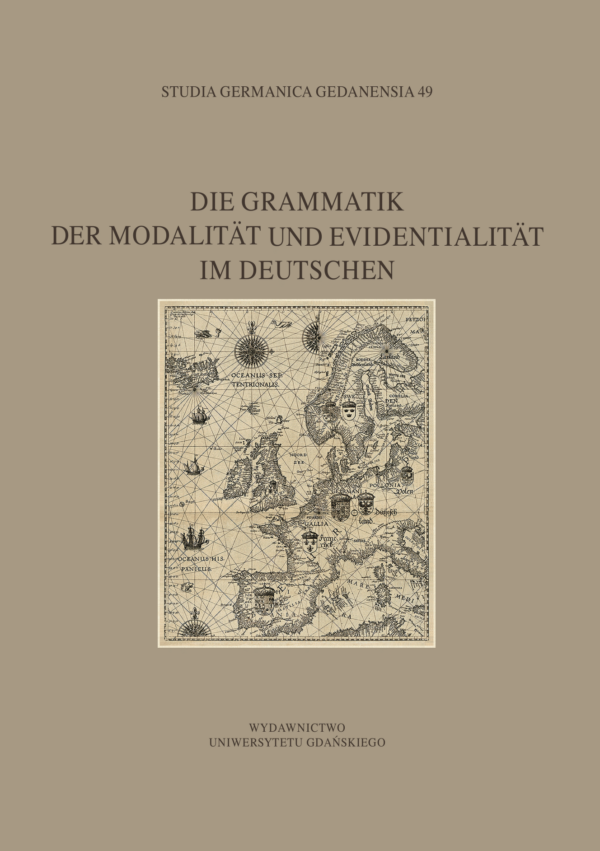Distanzinterpretationen bei reportativen Markern: ein Vergleich zwischen dt. [soll + inf] und ndl. [zou + inf]
DOI:
https://doi.org/10.26881/sgg.2023.49.04Słowa kluczowe:
reportative Evidentialität, epistemische Übertöne, reportative Exzeptionalität, Modalverben, kontrastive LinguistikAbstrakt
In diesem Beitrag steht die reportative Verwendung von sollen und seinem niederländischen „Pendant“ zou im Vordergrund. Dabei geht es vor allem um die Frage, inwiefern sich beide Marker im Hinblick auf das Vorhandensein von Distanzinterpretationen unterscheiden. Mithilfe zweier Korpusstudien kann gezeigt werden, dass Distanzinterpretationen häufiger bei zou vorliegen als bei soll und außerdem unterschiedliche Kontexte bevorzugen: zou erscheint relativ häufig in Komplementkonstruktionen, die aufgrund ihrer starken Assoziation mit Multiperspektivität eine distanzierende Lesart nahelegen; reportatives sollen ist in Komplementkonstruktionen kaum belegt.
Downloads
Bibliografia
Aikhenvald, Alexandra (2003): Evidentiality in typological perspective. In: Alexandra Aikhenvald, Robert M.W. Dixon (Hg.): Studies in evidentiality. Amsterdam, Philadelphia: Benjamins, 1–31.
Aikhenvald, Alexandra (2004): Evidentiality. Oxford: Oxford University Press.
Aikhenvald, Alexandra (Hg.) (2018): The Oxford Handbook of Evidentiality. Oxford: Oxford University Press. AnderBois, Scott (2014): On the exceptional status of reportative evidentials. In: Proceedings of SALT 24, 234–254.
Baumann, Carolin (2017): Bedeutung und Gebrauch der deutschen Modalverben. Lexikalische Einheit als Basis konzeptueller Vielfalt. Berlin, Boston: Walter de Gruyter.
Cornillie, Bert (2018): On speaker commitment and speaker involvement. Evidence from evidentials in Spanish talk in interaction. In: Journal of Pragmatics 128, 161–170.
De Haan, Ferdinand (2001): The relation between modality and evidentiality. In: Reimar Müller, Marga Reis (Hg): Modalität und Modalverben im Deutschen. [Linguistische Berichte, Heft 9]. Hamburg: Buske, 201–216.
Diewald, Gabriele (1999): Die Modalverben im Deutschen. Tübingen: Niemeyer.
Diewald, Gabriele / Smirnova, Elena (2013): Kategorien der Redewiedergabe im Deutschen. In: ZGL 41 (3), 443–471.
Faller, Martina (2019): The discourse commitments of illocutionary reportatives. In: Semantics and Pragmatics 12 (8), 1–46.
Harmes, Ingeborg (2017): A synchronic and diachronic study of the Dutch Auxiliary Zou(den). In: Juana I. Marín Arrese, Gerda Haßler, Marta Carretero (Hg.): Evidentiality Revisited: Cognitive grammar, functional and discourse pragmatic perspectives. Amsterdam: Benjamins, 149–169.
Letnes, Ole (2008): Quotatives sollen und Sprecherhaltung. In: Ole Letnes, Eva Maagerø, Heinz Vater (Hg.): Modalität und Grammatikalisierung. Trier: WVT, 23–37.
Mélac, Eric (2014): L’ évidentialité en anglais – approche contrastive à partir d’ un corpus anglais tibétain. Paris, Doktorarbeit. Mortelmans, Tanja (2000): On the evidential nature of the epistemic use of the German modals müssen and sollen. In: Belgian Journal of Linguistics 14 (1), 131–148.
Mortelmans, Tanja (2009): Erscheinungsformen der indirekten Rede im Niederländischen und Deut schen zou , soll(te) und der Konjunktiv I. In: Werner Abraham, Elisabeth Leiss (Hg.): Modalität. Epistemik und Evidentialität bei Modalverb, Adverb, Modalpartikel und Modus. Tübingen: Stauf fenburg, 171–190.
Mortelmans, Tanja (2016): Indirect evidentiality in Dutch and German: a contrastive corpus study of the seem type verbs schijnen and scheinen. In: Kalbotyra 69, 121–159.
Mortelmans, Tanja (2017): Seem type Verbs in Dutch and German: lijken, schijnen & scheinen. In: Juana Isabel Marín Arrese, Gerda Haßler, Marta Carretero (Hg.): Evidentiality Revisited. Cognitive grammar, functional and discourse pragmatic perspectives. Amsterdam/Philadelphia: Benjamins, 123–148.
Mortelmans, Tanja / Stathi, Katerina (2022): Evidentiality in German. In: Björn Wiemer, Juana I. Marin Arrese (Hg.): Evidential Marking in European Languages: Toward a Unitary Compara tive Account. Berlin, Boston: De Gruyter Mouton, 137–168.
Mortelmans, Tanja (i.D.): Frequency differences in reportative exceptionality and how to account for them. A case study on verbal reportative markers in French, Dutch and German. In: Studies in Language. Smirnova, Elena (2006): Die Entwicklung der Konstruktion würde + Infinitiv im Deutschen: Eine funktional semantische Analyse unter besonderer Berücksichtigung sprachhistorischer Aspekte. Berlin, New York: De Gruyter.
Grondelaers, Stefan / Deygers, Katrien / van Aken, Hilde (2000): Het Condiv corpus geschreven Nederlands. In: Nederlandse Taalkunde 5 (4), 356–363.
Wiemer, Björn / Socka, Anna (2017) : How much does pragmatics help to contrast the meaning of hearsay adverbs ? (Part 1). In : Studies in Polish linguistics 12 (1), 27–56.
Wiemer, Björn (2018): Evidentials and epistemic modality. In: Alexandra Y. Aikhenvald (Hg.): The Oxford Handbook of Evidentiality. Oxford: Oxford University Press, 85–108.
Willett, Thomas (1988): A cross linguistic survey of the grammaticization of evidentiality. In: Studies in Language 12 (1), 51–97.
Pobrania
Opublikowane
Jak cytować
Numer
Dział
Licencja
Copyright by Instytut Filologii Germańskiej, Wydawnictwo Uniwersytetu Gdańskiego.

 Uniwersyteckie Czasopisma Naukowe
Uniwersyteckie Czasopisma Naukowe




